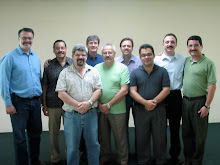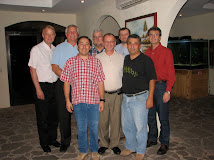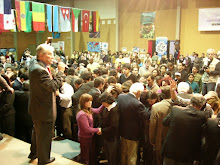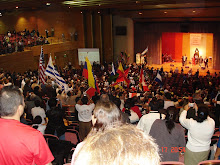
A sketch on the mobilization of the Latin American Church
Characteristic, Tendencies, Strengths and Challenges
Carlos Scott
The Evangelical Latin American Church has grown quickly in the last 50 years. The nationalization of the leadership in the first half of the century and the emergence of national churches in the 30s, were decisive factors for the development of effective contextualized ecclesiastical structures.
According to statistics, Latin America has 80.000.000 evangelicals, but only approximately 7,500 missionary (2001) correspondents to other fields. This represents 0,009375% of the quantify of evangelicals. In light of the number of evangelical Latin Americans, the number of missionaries we are sending does not correspond to the unreached and less evangelised ethnos. Despite the growth of the Latin American church, the number of cross-cultural missionaries we are sending out does not correspond to the need.
Characteristic, Tendencies, Strengths and Challenges
Carlos Scott
The Evangelical Latin American Church has grown quickly in the last 50 years. The nationalization of the leadership in the first half of the century and the emergence of national churches in the 30s, were decisive factors for the development of effective contextualized ecclesiastical structures.
According to statistics, Latin America has 80.000.000 evangelicals, but only approximately 7,500 missionary (2001) correspondents to other fields. This represents 0,009375% of the quantify of evangelicals. In light of the number of evangelical Latin Americans, the number of missionaries we are sending does not correspond to the unreached and less evangelised ethnos. Despite the growth of the Latin American church, the number of cross-cultural missionaries we are sending out does not correspond to the need.
What is the problem that is affecting the numeric growth of the Latin American church while the biggest shipments and missionaries, known as cross-cultural, are mobilizing to fields?
In the year 1900 the situation in South America registered 14,376 evangelicals in The Guyanas 14,376, in the Hispanic part 5.240 and in Brazil 11,376. The total in 1900 would be of a little more than 20,000 people. There are data that the total evangelical community would be up to 50,000, and during this century the growth is reflected in the following numbers: 1916–378,000; 1925–756,000; 1936–7,200,000; 1967–14,746,200; 1973–20,000,000; 1987–37,432,000; 2000–80,000,000. (Nuñez, E. & Taylor, W. Crisis and Hope in Latin America. Pasadena, CA: William Carey Library, 1996, p.161)
But, to grow in size is one thing, to grow in maturity is another. The mere numeric growth has become an objective of some, and, for many, “the objective justifies the means.” Any method that contributes to increase the number of members in the church is valid, and the search for the strategies that are most effective has taken to methodologies that reduce the gospel and put biblical principles at risk.
Bertil Ekstrom in his investigations affirms that the positive aspects of the Latin American Church are in its emphasis on evangelization. We like “to win souls”, to share the faith and to plant churches. However, the problem was that many times we have only given emphasis to the spiritual part, forgetting that the human being is more than the “soul.”
Another basic parallel topic is the lack of teaching of the whole Word of God. Depth and spirituality have been confused with emotional and spectacular experiences. In many cases, the practice of discipleship has not existed and biblical studies make reference to isolated texts that maintain the Christian life, but they don't nurture toward a spiritual maturity. Syncretism, spiritual malnutrition, heresies, superstition, division, unconscious supernatural experiences; etc., etc..
The Latin American leadership follows global tendencies of charismatic leaders (with strong personality and power of convincing), mainly centered in the formation of mega-churches. The leadership of our churches continues to be a priority. The result of the investigations shows that the churches with autocratic and charismatic leaders are those that grow more. At the same time, a new generation of leaders exists looking to develop the work in teams, giving emphasis to quality and a participation of the local church. The political democratisation in the countries is reflected in the churches and the youth of our days no longer accept, in the same way, the dogmatism of an autocratic leadership. The church needs to meditate about its form of government and leadership.
The Latin American leadership follows global tendencies of charismatic leaders (with strong personality and power of convincing), mainly centered in the formation of mega-churches. The leadership of our churches continues to be a priority. The result of the investigations shows that the churches with autocratic and charismatic leaders are those that grow more. At the same time, a new generation of leaders exists looking to develop the work in teams, giving emphasis to quality and a participation of the local church. The political democratisation in the countries is reflected in the churches and the youth of our days no longer accept, in the same way, the dogmatism of an autocratic leadership. The church needs to meditate about its form of government and leadership.
In most of the Latin American countries we are living among second to fourth generation believers. Although many churches began among the poorest social class, little by little, the families are achieving better financial conditions. Although we still have poor communities and many without the minimum resources to live decently; but in general, the Latin American Church is going a process of economic improvement.
In recent years, the Latin American Church has awakened to respond to its social responsibility. This has been one of the big contributions of the Latin American theology; the emphasis in the reality of the Kingdom of God in the current society. They are also intruding in the politics of some believers, but the fact that a member of our church arrives to a high political position has not modified the situation. We continue living in corrupt and unjust countries, with a high degree of violence and high crime rate.
In the first congress of COMIBAM (Ibero-American Missionary Cooperation) in San Pablo (Brazil) in 1987, an estimate of the Latin American missionary movement was made. Around 60 organizations sent about 1,600 missionary cross-culturally.
In recent years, the Latin American Church has awakened to respond to its social responsibility. This has been one of the big contributions of the Latin American theology; the emphasis in the reality of the Kingdom of God in the current society. They are also intruding in the politics of some believers, but the fact that a member of our church arrives to a high political position has not modified the situation. We continue living in corrupt and unjust countries, with a high degree of violence and high crime rate.
In the first congress of COMIBAM (Ibero-American Missionary Cooperation) in San Pablo (Brazil) in 1987, an estimate of the Latin American missionary movement was made. Around 60 organizations sent about 1,600 missionary cross-culturally.
 Ten years later, in preparation for the second congress of COMIBAM, in Mexico 1997, a systematic investigation was made with the purpose of evaluating the missionary movement of the last decade. The conclusion was reached that there were around 300 sending organizations and about 4,000 cross-cultural missionaries. Today it is calculated that 7,500 missionaries and some 400 organizations exist.
Ten years later, in preparation for the second congress of COMIBAM, in Mexico 1997, a systematic investigation was made with the purpose of evaluating the missionary movement of the last decade. The conclusion was reached that there were around 300 sending organizations and about 4,000 cross-cultural missionaries. Today it is calculated that 7,500 missionaries and some 400 organizations exist. However, our missionary movement is still emergent and of incipient history in comparison with the Anglo-Saxon world. There are factors of concern in the sending of missionaries as they exit to the field without due training, a strong financial support or pastoral care.
To weigh that a certain saturation level has been reached one can still observe that there are few local churches involved in missions. Apparently the Latin American church lacks basic training for this global responsibility. It is more accustomed to receive than to give. Many churches and denominations are the product of the external missionary work, but it is not observed that the nascent churches possess a mentality for a balanced and simultaneous expansion toward “Jerusalem, Judea, Samaria and until the ends of the earth”.
Why aren´t most of the Pastors involved in cross-cultural missions at the present time?, Why do some of these Pastors say “this is mine”? What should their response be? How to develop a healthy biblical misiology?
A transformation gospel implies a church that passes over all types of opposition, be they cultural, religious, linguistic, geographical, political, etc., so that all have the opportunity to hear the gospel in their own language, in a culturally sensitive way, and to be able to respond to the Lord.
The purpose of the mobilization in Iberoamerica is to help to the church to be what God wants it to be, to do what God wants it to do and to go where God wants it to go. Therefore the effort in the mobilization is dedicated to: ¨To become for the churches of Iberoamerica a missionary force with the capacity to take the gospel of Jesus Christ to all the nations”
The main objective in the mobilization is to see pastoral leadership committed to the missionary work and to develop support strategies together with the churches in the different stages of maturity of this process. Pastors challenging Pastors, churches modelling other churches, working in cooperation with other churches to carry out attainable missionary projects and having more impact among the towns less evangelised and unreached. The church needs a transformation in its call, transformation in its commitment, revision of its purpose and a return to the simple things that gave it origin.
To achieve this we will make emphasis in the following aspects:
1. To deepen our understanding of an integral missiology in the foundation of churches. The mission embraces the verbal proclamation of the gospel as a social responsibility. Does our restlessness make us wonder: How many believers are there? And if not: Is the church reflecting the values of the Kingdom of God in the nations to the end of the earth? The mission of the church is indivisible.
2. To emphasize in the church to adopt its missionary nature from the missionary God to whom we serve. That is to say, that the church is missionary because God is a missionary God. Our goals, reasons, strategies, methods, etc., should be according to the mission and nature of God. We challenge to evaluate the way in that we are completing this objective.
3. To revise our vision of Christ. Many have taken Christ's vision as a “conqueror” relating it indirectly to a “crusade.” What does this mean when we share the gospel? How will a Muslim respond if we introduce Christ in this way?
4. To develop an understanding of the pluralism and emphasize the undivided and Christ's universality. To be in agreement that the hope we have is in Christ and not in Mohammed, Buda or any other spiritual entity. We should say that Jesus is the Lord, having firm reasons that support it.
5. To form “ecclesiastic communities” that reflects the reconciliation, spirit, love and pardon. The local church is called to form an alternative community to the ends of the earth. We are not called to form managerial outlines based on approaches of utilitarianism, commercialism and records.
6. To have a balance between "The people of the church" (those that are involved) and "The church in the nation" (those that use their church values in a political and social outlook). We are more preoccupied with the amount of people that participate in church activities than with whether or not those people's testimonies are effective in their daily work. We are more preoccupied in having control than equipping them with a witness to the ends of the Earth.
7. To grow in unity as “a body” in function of the mission. From this principle the Lord has challenged us to work as a team. The mission can be the material standard of our unity. The cooperation in the practical task of the mission is a motivator to the first step towards a deeper unity. To grow in the testimony based on the “unity in Christ.” The Church as a whole is responsible for the evangelisation of all peoples, races and languages.
8. To advance toward the understanding of the Holy Spirit and the mission. The Church is called to live according to the justice of the Kingdom, in the power of the Spirit. The statement that the whole Church is missionary it is based on the universal priesthood of the believers. It is for the execution of this mission that Jesus Christ has endowed to his church the gifts and the power of the Holy Spirit. To be missionary the Church should renovate its dependence of the Spirit and surrender to prayer.
9. Provide the resources necessary for the adequate equipping of the missionary candidates and the church in general through the network of centers and programs whose main function is to equip. This net connects people that work in the biblical-theological area, cross-cultural and ministry departments of the church. The training of the church is enlarged solving this specific necessity. In International COMIBAM we intend that the missionary's training begin in the local church. We consider that 60 percent can be born in it. The emphasis is to strengthen the congregations and its commitment with the cross-cultural missions.
10.To attend and to accompany the church, and the candidate in their training process, shipment, supervision and pastoral care in the field, through Net of missionary agencies and shipment. To provide attendance to the missionary movement in the program Reaches a Town. In International COMIBAM we help to the development of national missionary agencies that respond to the needs of the country, but mainly respect the centralism of the local churches. This respect is a basic distinguished characteristic of the missionary movement in Iberoamerica. In each opportunity we have, we invite the Anglo-Saxon missionary agencies to change their approach and focus of missionaries in Iberoamerica to a corporative manner, meaning to a church instead of a individual. We also encourage them to support the existent missionary efforts and to avoid the unnecessary duplication or interruption of the operation of the emergent missionary agencies, threatened by the volumes of material resources and the awesome experience of the north.
To achieve this we will make emphasis in the following aspects:
1. To deepen our understanding of an integral missiology in the foundation of churches. The mission embraces the verbal proclamation of the gospel as a social responsibility. Does our restlessness make us wonder: How many believers are there? And if not: Is the church reflecting the values of the Kingdom of God in the nations to the end of the earth? The mission of the church is indivisible.
2. To emphasize in the church to adopt its missionary nature from the missionary God to whom we serve. That is to say, that the church is missionary because God is a missionary God. Our goals, reasons, strategies, methods, etc., should be according to the mission and nature of God. We challenge to evaluate the way in that we are completing this objective.
3. To revise our vision of Christ. Many have taken Christ's vision as a “conqueror” relating it indirectly to a “crusade.” What does this mean when we share the gospel? How will a Muslim respond if we introduce Christ in this way?
4. To develop an understanding of the pluralism and emphasize the undivided and Christ's universality. To be in agreement that the hope we have is in Christ and not in Mohammed, Buda or any other spiritual entity. We should say that Jesus is the Lord, having firm reasons that support it.
5. To form “ecclesiastic communities” that reflects the reconciliation, spirit, love and pardon. The local church is called to form an alternative community to the ends of the earth. We are not called to form managerial outlines based on approaches of utilitarianism, commercialism and records.
6. To have a balance between "The people of the church" (those that are involved) and "The church in the nation" (those that use their church values in a political and social outlook). We are more preoccupied with the amount of people that participate in church activities than with whether or not those people's testimonies are effective in their daily work. We are more preoccupied in having control than equipping them with a witness to the ends of the Earth.
7. To grow in unity as “a body” in function of the mission. From this principle the Lord has challenged us to work as a team. The mission can be the material standard of our unity. The cooperation in the practical task of the mission is a motivator to the first step towards a deeper unity. To grow in the testimony based on the “unity in Christ.” The Church as a whole is responsible for the evangelisation of all peoples, races and languages.
8. To advance toward the understanding of the Holy Spirit and the mission. The Church is called to live according to the justice of the Kingdom, in the power of the Spirit. The statement that the whole Church is missionary it is based on the universal priesthood of the believers. It is for the execution of this mission that Jesus Christ has endowed to his church the gifts and the power of the Holy Spirit. To be missionary the Church should renovate its dependence of the Spirit and surrender to prayer.
9. Provide the resources necessary for the adequate equipping of the missionary candidates and the church in general through the network of centers and programs whose main function is to equip. This net connects people that work in the biblical-theological area, cross-cultural and ministry departments of the church. The training of the church is enlarged solving this specific necessity. In International COMIBAM we intend that the missionary's training begin in the local church. We consider that 60 percent can be born in it. The emphasis is to strengthen the congregations and its commitment with the cross-cultural missions.
10.To attend and to accompany the church, and the candidate in their training process, shipment, supervision and pastoral care in the field, through Net of missionary agencies and shipment. To provide attendance to the missionary movement in the program Reaches a Town. In International COMIBAM we help to the development of national missionary agencies that respond to the needs of the country, but mainly respect the centralism of the local churches. This respect is a basic distinguished characteristic of the missionary movement in Iberoamerica. In each opportunity we have, we invite the Anglo-Saxon missionary agencies to change their approach and focus of missionaries in Iberoamerica to a corporative manner, meaning to a church instead of a individual. We also encourage them to support the existent missionary efforts and to avoid the unnecessary duplication or interruption of the operation of the emergent missionary agencies, threatened by the volumes of material resources and the awesome experience of the north.
We want a different Ibero-American Church that simultaneously transforms the local society and the ends of the earth.

















































































